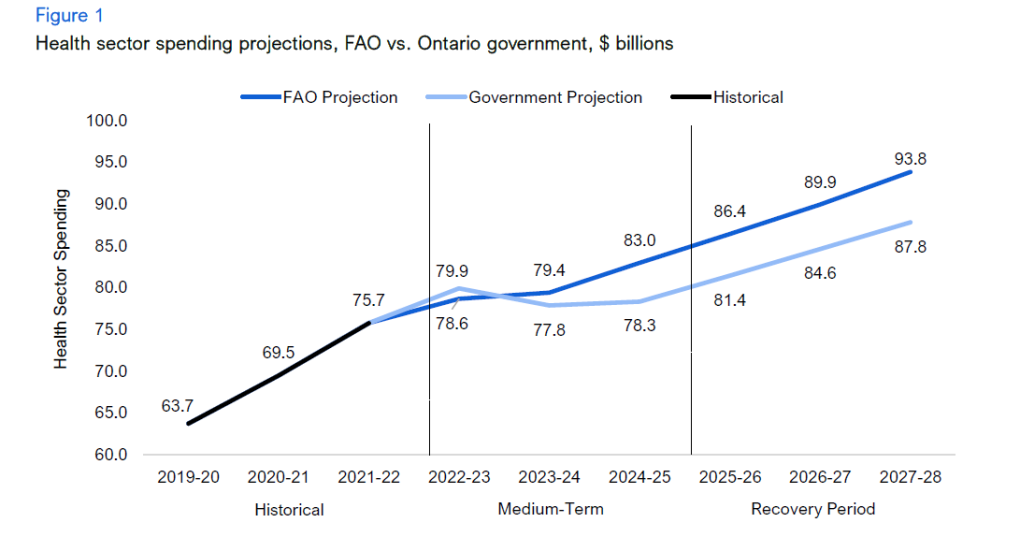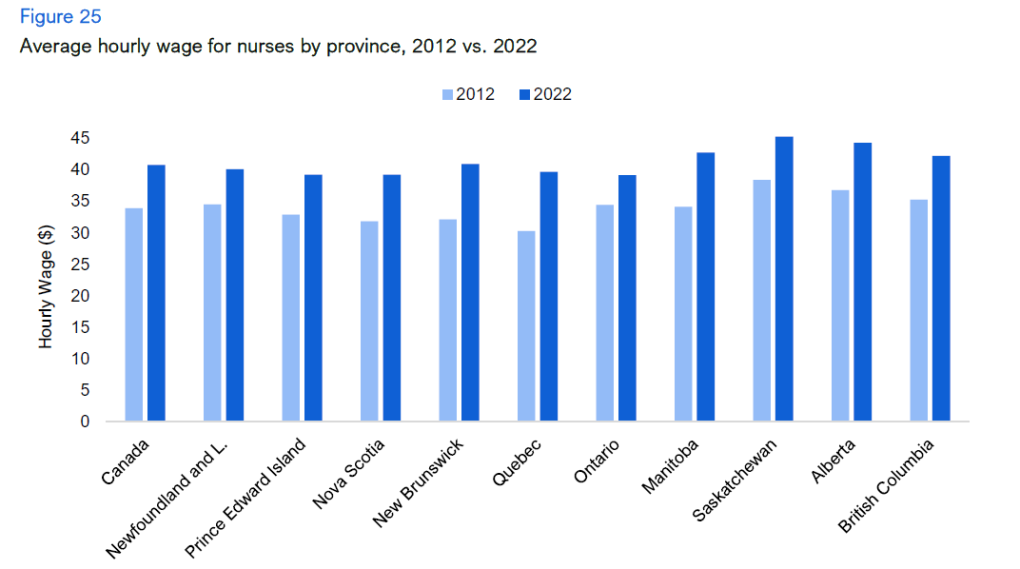Ontario unlikely to meet health-care goals due to underspending and staffing, report finds
The challenges facing Ontario’s strained health-care system are “expected to persist” as a result of underfunding and a shortage of frontline workers, a new report from the province’s fiscal watchdog suggests.
In a report released Wednesday, the Financial Accountability Office (FAO) found that Ontario will be short about $21.3 billion in health spending by 2027-2028. As a result, it is “unlikely” the province will achieve its goals of adding enough beds and hiring enough staff to keep up with demand.
According to the FAO, the government has allocated about $87.8 billion to be spent on health care by 2027-2028. Spending, however, is expected to grow to about $93.8 billion.
“We found that the province is making significant investments to expand capacity hospitals, home care and long term care. But the overall spending plan is not enough to meet its commitments, let alone increases in demand from Ontario and growing an aging population,” Financial Accountability Officer Peter Weltman told reporters on Wednesday.
“Even with current expansion plans by 2027, Ontario will have less capacity in hospitals and long term care than it did in 2019.”
- Download our app to get local alerts on your device
- Get the latest local updates right to your inbox
The projections also don’t take into account a court challenge loss on Bill 124—legislation that capped public sector workers’ salaries at one per cent for three years. The government is appealing a ruling that found the bill infringes on the applicants' rights to freedom of association and collective bargaining.
If it loses, the province will be on the hook for an additional $3.6 billion in wages.
The report also doesn’t take into account and future investments, such as any new funding announced in the budget scheduled for March 23. Weltman said that money from the province’s contingency plans as well as federal transfer allocations could be used to address the shortfall.
Finance Minister Peter Bethlenfalvy told reporters at a news conference in Pickering that it’s his job to ensure the government’s health priorities are funded.
“We've seen the health care budget go up by over $5 billion last year. We're going to continue,” he said. “I wouldn't be doing my job as finance minister if I didn't have contingencies.”
It is unclear what those contingencies entail.
HISTORIC HOSPITAL WAIT TIMES
The report reviews five government priorities as outlined in multiple versions of Premier Doug Ford’s health-care plans and paints a dire picture of Ontario’s strained health-care system.
 A Ontario Financial Accountability Office (FAO) highlights a $21-billion shortfall in health spending by 2027-2028. (FAO report)
A Ontario Financial Accountability Office (FAO) highlights a $21-billion shortfall in health spending by 2027-2028. (FAO report)
In 2022-23, the average length of stay in an emergency department for patients admitted to hospitals was about 20.9 hours, the report found.
“This is 34 per cent higher than wait times over the five-year period prior to the COVID-19 pandemic and the longest average wait time recorded in over 15 years.”
The report also noted there is a 250,000 patient surgical backlog in Ontario as of September 2022. The province has indicated they want to reduce the waitlist by 50,000—pre-pandemic levels—by end of March 2023. In order to do this, the Progressive Conservatives have put forth legislation allowing private clinics to perform some OHIP covered surgeries as well as diagnostic procedures.
Despite these measures, the FAO notes the province is not likely to reach its goal.
“Assuming no further interruptions, similar volumes of surgeries being performed and similar volumes of patients being added to the waitlist, the Province is on track to reduce the surgical waitlist back to 200,000 patients by July 2024.”
Last year, Ontario logged 145 unplanned emergency department closures as a result of staffing shortages and higher-than-usual capacity.
The FAO noted that prior to 2022, its office was only aware of one unplanned ER closure due to a lack of doctors since 2006.
The province has committed to freeing up about 7,000 hospital beds by 2028—4,500 new beds will be added, while an additional 2,500 occupied by alternative level of care (ALC) patients will be made available.
The Ford government put forward legislation in September that would allow hospitals to fine patients waiting for a spot in long-term care a daily $400 fee if they do not accept a hospital bed rentals in a facility not of their choosing. This would, the ministry of health said at the time, free up space for acute patients who needed hospital care.
However, the FAO says the province is unlikely to achieve this given the funding shortfall and the length of the waitlist for long-term care, which makes moving ALC patients challenging. There are also over 39,000 people waiting for a spot in long-term care.
As of December 2022, about 350 beds occupied by ACL patients had been freed up, the report said.
Even if the government was able to expand capacity by 7,000 beds, the FAO projects Ontario will still need an additional 500 spots to meet the province’s growing and aging population.
“The More Beds, Better Care Act, 2022 (known as Bill 7) does give patients in hospitals waiting for a long-term care bed priority over patients waiting in the community,” the report says. “However, there still must be a space available for the patient and the long-term care home must have the necessary supports to meet the patient’s care needs.
“This suggests that without additional measures, Ontario will have less available hospital capacity relative to need in 2027-28 than in 2019-20.”
Ontario is hoping to add 30,000 new long-term care beds by 2028, representing an increase of about 34 per cent, and spend an additional $1 billion on home care services.
However, the FAO warns the number of Ontarians aged 75 and over will increase by 37 per cent.
“Therefore, despite the significant increase in the number of long-term care beds by 2027-28, the FAO estimates that Ontario will still have fewer beds per Ontarian aged 75 and over in 2027-28 than it did in 2019-20.”
In response to the report, a spokesperson for the minister of health said in a statement that it’s plan is working.
“We’ve added more hospital beds in four years than the Liberals did in fourteen,” Hannah Jensen said. “In 2022, Ontario broke records by registering more new nurses than ever before. Emergency department wait times are coming down and we’ve started to shorten wait times for key surgeries.”
“Nearly 100,000 people have connected to convenient care at the pharmacy for a common ailment.”
ONTARIO SHORT 33K NURSES AND PSWs
According to the FAO report, Ontario needs to hire 86,700 new nurses and personal support workers by 2027-2028 in order to return to pre-pandemic vacancy rates as well as meet the government’s expanded health-care commitments.
As it stands, the FAO projects the province will add 53,700 staff over the next six years, primarily by accelerated registration for international nurses and increasing enrolment in post-secondary education programs.
“This increase in nurses and PSWs will not be sufficient to address current staffing shortages and meet Ontario’s commitments to expand care in hospitals, long-term care and home care,” the report said, noting the 33,000 nurse shortfall.
“Failure to address the projected shortfall in nurses and PSWs will result in the province being unable to meet its expansion commitments in hospitals, home care and long-term care, and will also have additional impacts on health sector service levels”
The FAO says Ontario has the lowest wages for nurses in Canada, partly due to government wage restraint policies over the last 10 years. This has created additional challenges in both hiring and retaining staff in the health sector, the FAO found.
 This chart found in a March 8, 2023 FAO report shows the average wages for nurses in Ontario compared to other provinces.
This chart found in a March 8, 2023 FAO report shows the average wages for nurses in Ontario compared to other provinces.
The government, meanwhile, refuted this claim. A spokesperson said that according to a 2022 analysis from the Canadian Federation of Nurses' Unions and Statistics Canada, which indicates Ontario does not have the lowest wages for nurses.
A recent $2 to $3 raise provided to PSWs during the pandemic has the potential to boost employment by about 8,900 workers, the report found. However, the FAO warned staffing in health care is interdependent and a shortage throughout could impact a health facility’s ability to provide care, discharge patients and reduce waitlists and wait times.
“In order to address this shortfall, the Province may have to introduce new measures that would increase spending above the FAO’s health sector spending outlook,” the report read.
“For example, such measures could include increasing wages, reducing workloads, structuring staffing to use more desirable fulltime positions, increasing reliance on agency workers and private providers not subject to wage restraints, and/or adding new funding for education or training.”
CTVNews.ca Top Stories

BREAKING Emergency crews responding to avalanche in Whistler, B.C., area
Paramedics and search crews have been dispatched to the scene of an avalanche that struck Monday in the Whistler, B.C., area.
Quebec fugitive killed in Mexican resort town, RCMP say
RCMP are confirming that a fugitive, Mathieu Belanger, wanted by Quebec provincial police has died in Mexico, in what local media are calling a murder.
Bill Clinton hospitalized with a fever but in good spirits, spokesperson says
Former President Bill Clinton was admitted Monday to Georgetown University Medical Center in Washington after developing a fever.
Trump again calls to buy Greenland after eyeing Canada and the Panama Canal
First it was Canada, then the Panama Canal. Now, Donald Trump again wants Greenland. The president-elect is renewing unsuccessful calls he made during his first term for the U.S. to buy Greenland from Denmark, adding to the list of allied countries with which he's picking fights even before taking office.
Pioneering Métis human rights advocate Muriel Stanley Venne dies at 87
Muriel Stanley Venne, a trail-blazing Métis woman known for her Indigenous rights advocacy, has died at 87.
King Charles ends royal warrants for Ben & Jerry's owner Unilever and Cadbury chocolatiers
King Charles III has ended royal warrants for Cadbury and Unilever, which owns brands including Marmite and Ben & Jerry’s, in a blow to the household names.
Man faces murder charges in death of woman who was lit on fire in New York City subway
A man is facing murder charges in New York City for allegedly setting a woman on fire inside a subway train and then watching her die after she was engulfed in flames, police said Monday.
Canada regulator sues Rogers for alleged misleading claims about data offering
Canada's antitrust regulator said on Monday it was suing Rogers Communications Inc, for allegedly misleading consumers about offering unlimited data under some phone plans.
Multiple OnlyFans accounts featured suspected child sex abuse, investigator reports
An experienced child exploitation investigator told Reuters he reported 26 accounts on the popular adults-only website OnlyFans to authorities, saying they appeared to contain sexual content featuring underage teen girls.































